2024年备考中考冲刺英语语法总复习-情态动词 专题指导+课堂练习+2023真题演练(含答案)【通用版】
文档属性
| 名称 | 2024年备考中考冲刺英语语法总复习-情态动词 专题指导+课堂练习+2023真题演练(含答案)【通用版】 |
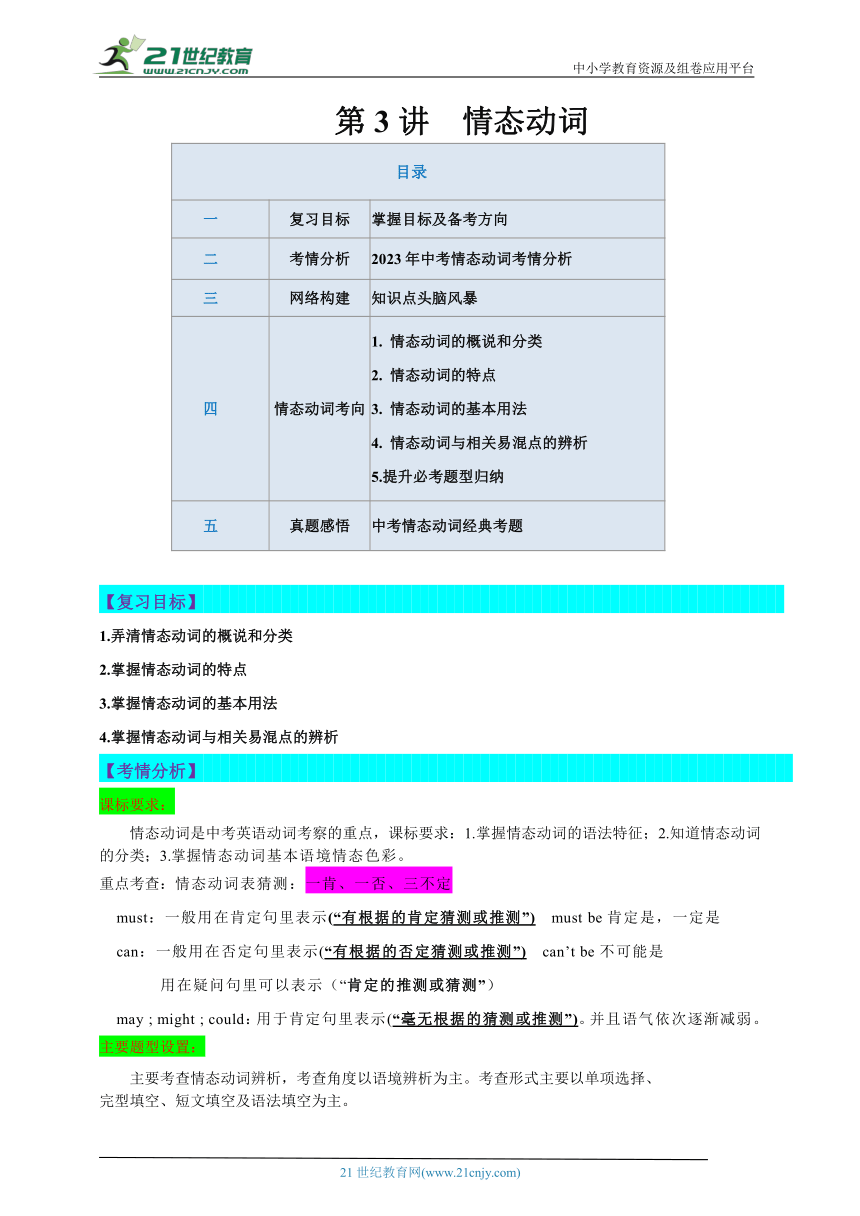
|
|
| 格式 | doc | ||
| 文件大小 | 523.3KB | ||
| 资源类型 | 试卷 | ||
| 版本资源 | 通用版 | ||
| 科目 | 英语 | ||
| 更新时间 | 2024-03-28 00:00:00 | ||
图片预览

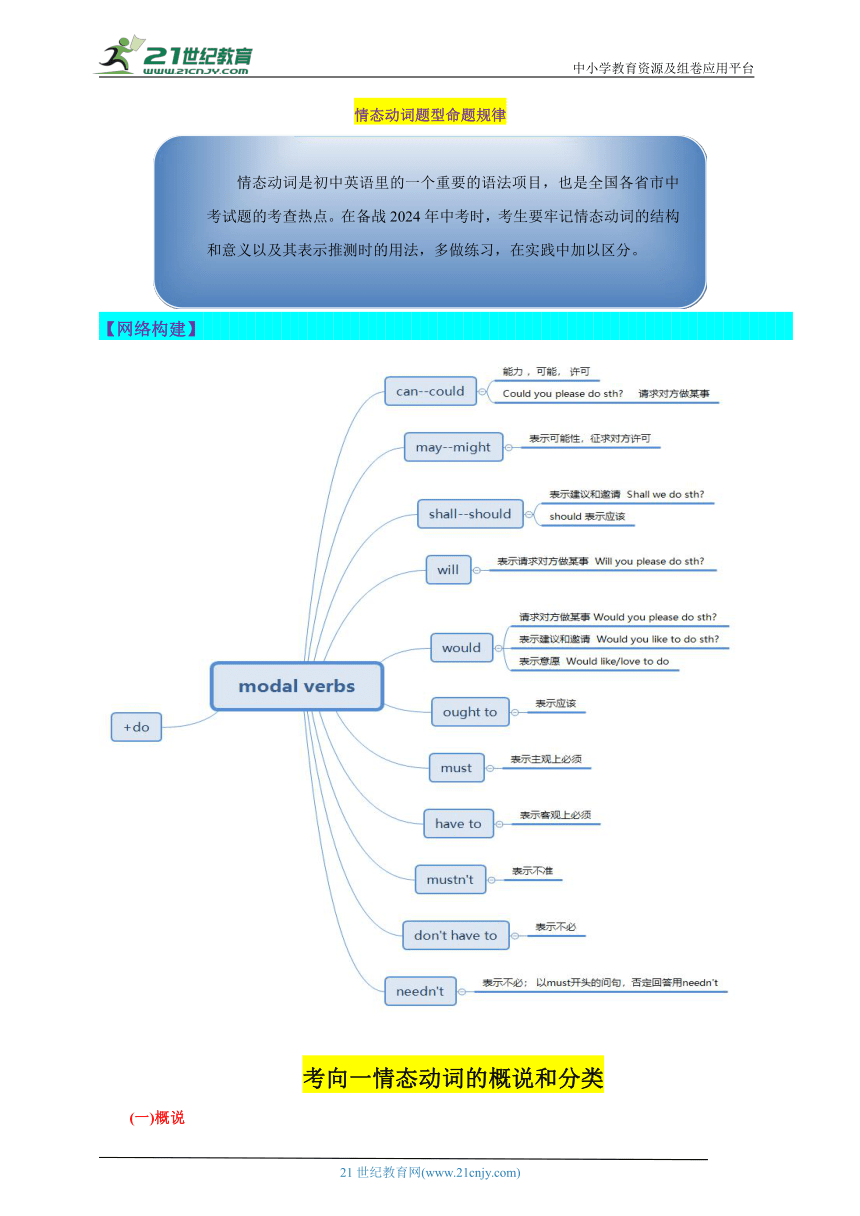
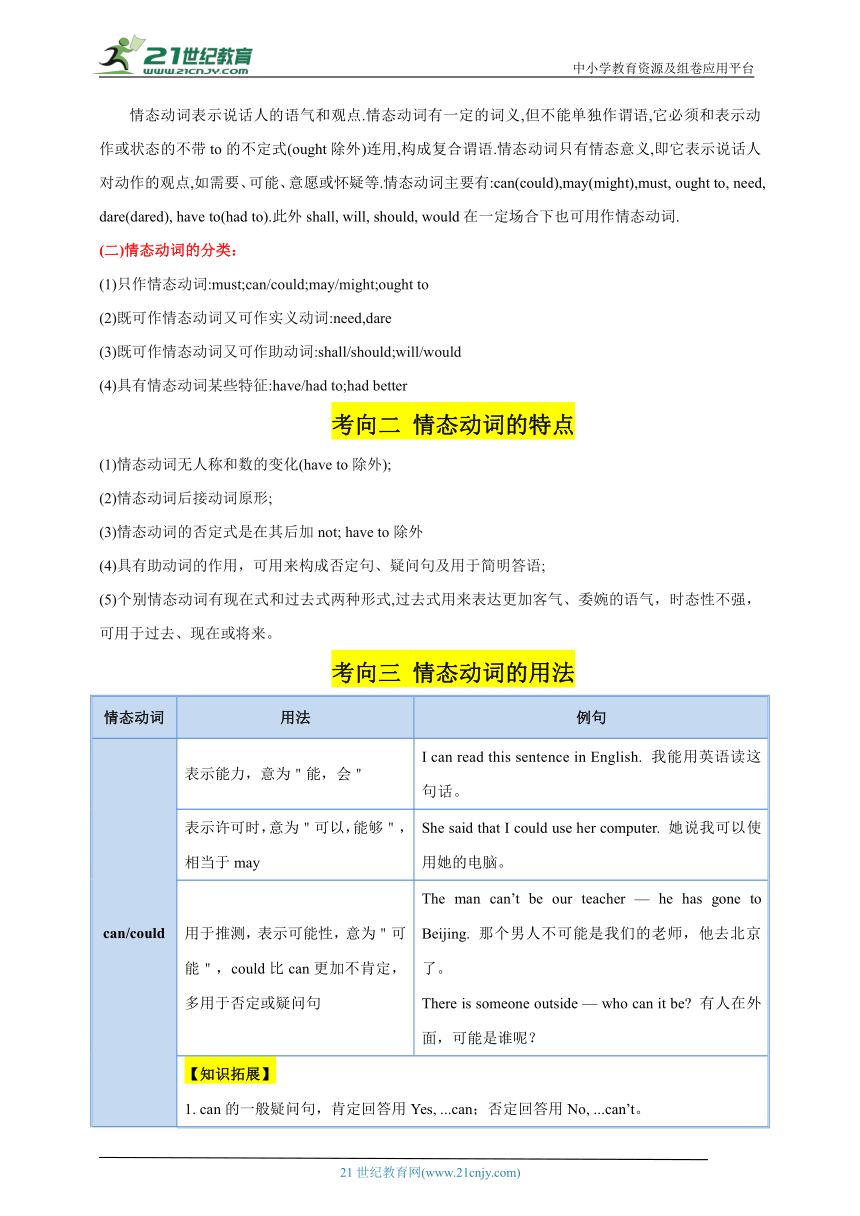
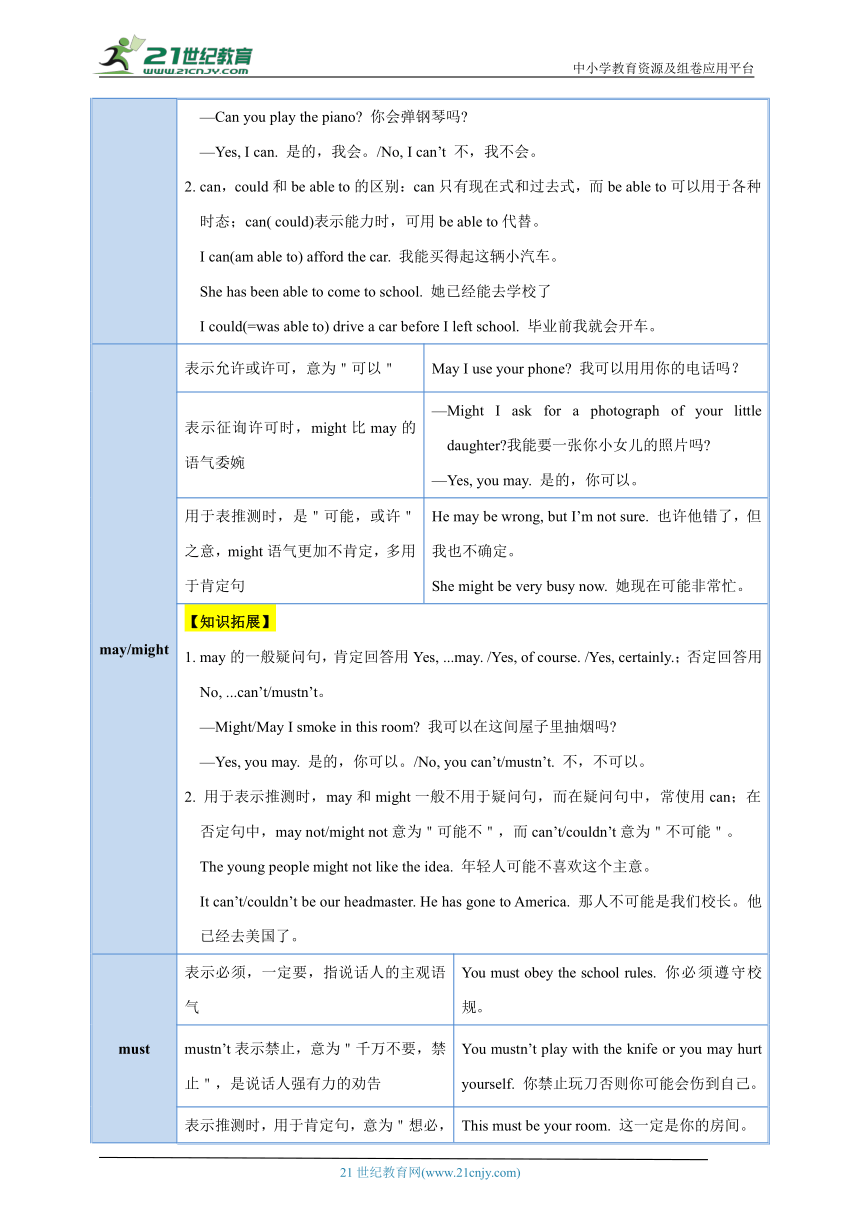
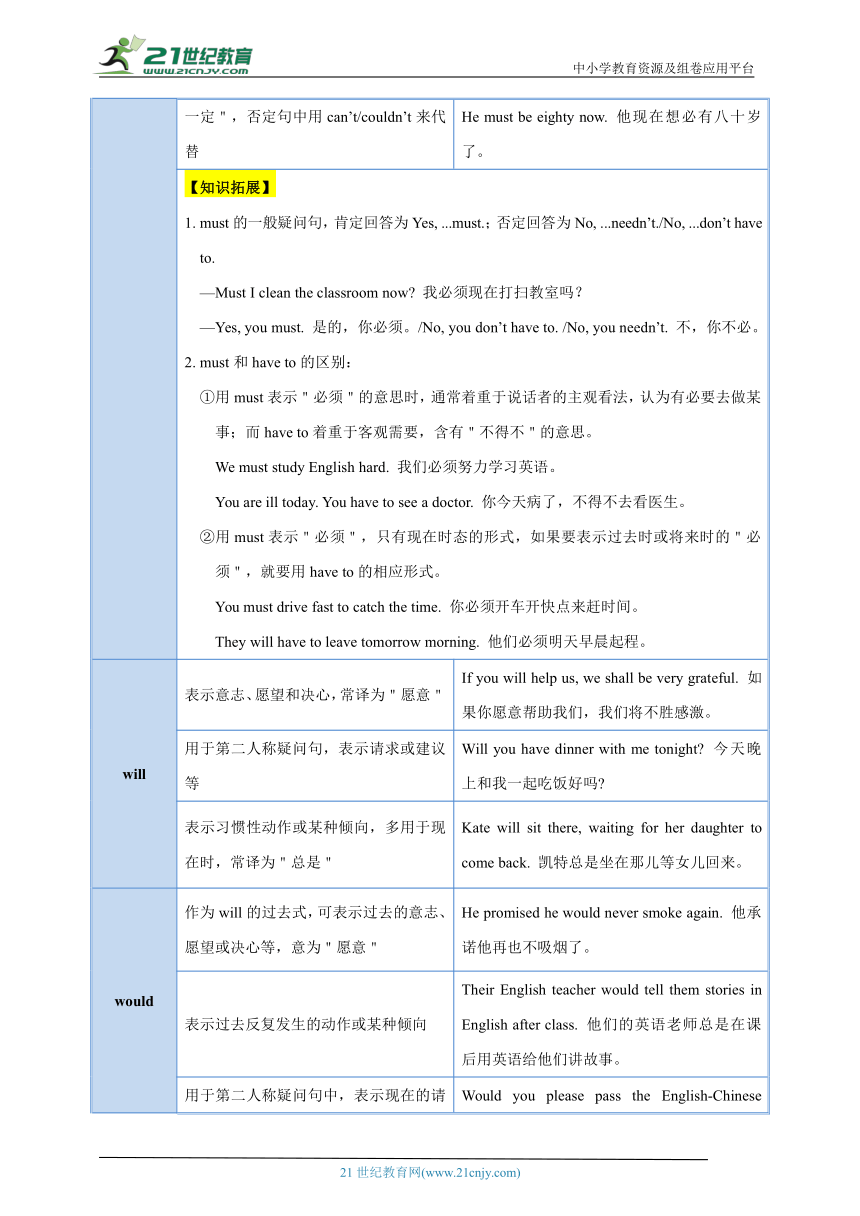
文档简介
中小学教育资源及组卷应用平台
第3讲 情态动词
目录
一 复习目标 掌握目标及备考方向
二 考情分析 2023年中考情态动词考情分析
三 网络构建 知识点头脑风暴
四 情态动词考向 情态动词的概说和分类情态动词的特点情态动词的基本用法情态动词与相关易混点的辨析5.提升必考题型归纳
五 真题感悟 中考情态动词经典考题
【复习目标】
1.弄清情态动词的概说和分类
2.掌握情态动词的特点
3.掌握情态动词的基本用法
4.掌握情态动词与相关易混点的辨析
【考情分析】
课标要求:
情态动词是中考英语动词考察的重点,课标要求:1.掌握情态动词的语法特征;2.知道情态动词的分类;3.掌握情态动词基本语境情态色彩。
重点考查:情态动词表猜测:一肯、一否、三不定
must:一般用在肯定句里表示(“有根据的肯定猜测或推测”) must be肯定是,一定是
can:一般用在否定句里表示(“有根据的否定猜测或推测”) can’t be不可能是
用在疑问句里可以表示(“肯定的推测或猜测”)
may ; might ; could:用于肯定句里表示(“毫无根据的猜测或推测”)。并且语气依次逐渐减弱。
主要题型设置:
主要考查情态动词辨析,考查角度以语境辨析为主。考查形式主要以单项选择、完型填空、短文填空及语法填空为主。
情态动词题型命题规律
【网络构建】
考向一情态动词的概说和分类
(一)概说
情态动词表示说话人的语气和观点.情态动词有一定的词义,但不能单独作谓语,它必须和表示动作或状态的不带to的不定式(ought除外)连用,构成复合谓语.情态动词只有情态意义,即它表示说话人对动作的观点,如需要、可能、意愿或怀疑等.情态动词主要有:can(could),may(might),must, ought to, need, dare(dared), have to(had to).此外shall, will, should, would在一定场合下也可用作情态动词.
(二)情态动词的分类:
(1)只作情态动词:must;can/could;may/might;ought to
(2)既可作情态动词又可作实义动词:need,dare
(3)既可作情态动词又可作助动词:shall/should;will/would
(4)具有情态动词某些特征:have/had to;had better
考向二 情态动词的特点
(1)情态动词无人称和数的变化(have to除外);
(2)情态动词后接动词原形;
(3)情态动词的否定式是在其后加not; have to除外
(4)具有助动词的作用,可用来构成否定句、疑问句及用于简明答语;
(5)个别情态动词有现在式和过去式两种形式,过去式用来表达更加客气、委婉的语气,时态性不强,可用于过去、现在或将来。
考向三 情态动词的用法
情态动词 用法 例句
can/could 表示能力,意为"能,会" I can read this sentence in English. 我能用英语读这句话。
表示许可时,意为"可以,能够",相当于may She said that I could use her computer. 她说我可以使用她的电脑。
用于推测,表示可能性,意为"可能",could比can更加不肯定,多用于否定或疑问句 The man can’t be our teacher — he has gone to Beijing. 那个男人不可能是我们的老师,他去北京了。There is someone outside — who can it be 有人在外面,可能是谁呢?
【知识拓展】1. can的一般疑问句,肯定回答用Yes, ...can;否定回答用No, ...can’t。—Can you play the piano 你会弹钢琴吗 —Yes, I can. 是的,我会。/No, I can’t 不,我不会。2. can,could和be able to的区别:can只有现在式和过去式,而be able to可以用于各种时态;can( could)表示能力时,可用be able to代替。I can(am able to) afford the car. 我能买得起这辆小汽车。She has been able to come to school. 她已经能去学校了I could(=was able to) drive a car before I left school. 毕业前我就会开车。
may/might 表示允许或许可,意为"可以" May I use your phone 我可以用用你的电话吗?
表示征询许可时,might比may的语气委婉 —Might I ask for a photograph of your little daughter 我能要一张你小女儿的照片吗 —Yes, you may. 是的,你可以。
用于表推测时,是"可能,或许"之意,might语气更加不肯定,多用于肯定句 He may be wrong, but I’m not sure. 也许他错了,但我也不确定。She might be very busy now. 她现在可能非常忙。
【知识拓展】1. may的一般疑问句,肯定回答用Yes, ...may. /Yes, of course. /Yes, certainly.;否定回答用No, ...can’t/mustn’t。—Might/May I smoke in this room 我可以在这间屋子里抽烟吗 —Yes, you may. 是的,你可以。/No, you can’t/mustn’t. 不,不可以。2. 用于表示推测时,may和might一般不用于疑问句,而在疑问句中,常使用can;在否定句中,may not/might not意为"可能不",而can’t/couldn’t意为"不可能"。The young people might not like the idea. 年轻人可能不喜欢这个主意。It can’t/couldn’t be our headmaster. He has gone to America. 那人不可能是我们校长。他已经去美国了。
must 表示必须,一定要,指说话人的主观语气 You must obey the school rules. 你必须遵守校规。
mustn’t表示禁止,意为"千万不要,禁止",是说话人强有力的劝告 You mustn’t play with the knife or you may hurt yourself. 你禁止玩刀否则你可能会伤到自己。
表示推测时,用于肯定句,意为"想必,一定",否定句中用can’t/couldn’t来代替 This must be your room. 这一定是你的房间。He must be eighty now. 他现在想必有八十岁了。
【知识拓展】1. must的一般疑问句,肯定回答为Yes, ...must.;否定回答为No, ...needn’t./No, ...don’t have to.—Must I clean the classroom now 我必须现在打扫教室吗?—Yes, you must. 是的,你必须。/No, you don’t have to. /No, you needn’t. 不,你不必。2. must和have to的区别:①用must表示"必须"的意思时,通常着重于说话者的主观看法,认为有必要去做某事;而have to着重于客观需要,含有"不得不"的意思。We must study English hard. 我们必须努力学习英语。You are ill today. You have to see a doctor. 你今天病了,不得不去看医生。②用must表示"必须",只有现在时态的形式,如果要表示过去时或将来时的"必须",就要用have to的相应形式。You must drive fast to catch the time. 你必须开车开快点来赶时间。They will have to leave tomorrow morning. 他们必须明天早晨起程。
will 表示意志、愿望和决心,常译为"愿意" If you will help us, we shall be very grateful. 如果你愿意帮助我们,我们将不胜感激。
用于第二人称疑问句,表示请求或建议等 Will you have dinner with me tonight 今天晚上和我一起吃饭好吗
表示习惯性动作或某种倾向,多用于现在时,常译为"总是" Kate will sit there, waiting for her daughter to come back. 凯特总是坐在那儿等女儿回来。
would 作为will的过去式,可表示过去的意志、愿望或决心等,意为"愿意" He promised he would never smoke again. 他承诺他再也不吸烟了。
表示过去反复发生的动作或某种倾向 Their English teacher would tell them stories in English after class. 他们的英语老师总是在课后用英语给他们讲故事。
用于第二人称疑问句中,表示现在的请求、建议,比will的语气委婉 Would you please pass the English-Chinese dictionary on to Mary 请把这本英汉词典传给玛丽好吗
【知识拓展】would like意为"愿意,想要";would like/love to do sth 意为"愿意/想要做某事";would like sb to do sth意为"想要某人做某事"。Would you like a cup of tea 你想喝杯茶吗?Would you like to sing a song 你想唱首歌吗?I would like you to wake me up at 5:30 tomorrow morning. 我想让你在明天早晨5:30叫醒我。
shall 用于第一、三人称疑问句,表示征求对方意见 Shall we begin now 我们现在就开始吗 ’Tom is waiting outside. Shall he come in, sir 汤姆正在门外等着,可以让他进来吗,先生
用于第二、三人称陈述句时,表示命令、警告、允诺或威胁等 Yon shall fail if you don't work hard. 如果你不努力工作,你就会失败。
should shall的过去式,用于第一、三人称,多用于间接引语中,以征求对方意见 I asked the manager if I should have a few days off. 我问经理我是否可以请几天假。
表示义务,职责时,意为"应当,应该",往往表示说话者的观点 We should obey the traffic rules.
表示惊讶、遗憾等,意为"竟然,居然"
need 表示"需要,必须",多用于疑问句和否定句 Need you go so soon 你需要这么早走吗 You needn’t come so early. 你不必来这么早。
【知识拓展】need的一般疑问句,肯定回答为Yes, ... must.;否定回答为No, ... needn’t.—Need he finish the article next week 他需要下星期完成这篇文章吗 —Yes, he must. 是的,他必须完成。/No , he needn’t. 不,他不需要。
have to 表示不得不,说明客观条件只能如此;有时态形式的变化;否定式don’t have to意为"不必"(=needn’t) My brother was very ill, so I had to call the doctor in the midnight. 我弟弟病得厉害,我只得半夜里把医生请来。I haven’t got any money with me, so I’ll have to borrow some from my friend. 我身上没带钱,只好向朋友借点了。
小试牛刀
1.I was with her in town just now. She ______ be in England now.
A. can’t B. needn’t C. mustn’t
2.Look out! The knife is very sharp. You ______ cut your finger.
A. need B. must C. may
3.—May I stop here
—No, you _____.
A.mustn’t B.may not C.won’t
4.He _______ be ill. He looks so pale.
A. must B. can C. may
5.—Must we hand in our homework now
—No, you ______.
A.mustn’t B. can’t C. needn’t
6.We _______ to protect animals.
A. must B.should C. need
7.—Excuse me, _______ I take the magazine out of the reading room
—Sorry, you can’t. Just here, please.
A.may B.would C.must
8.As long as you keep practicing speaking English every day, you _______ speak it well.
A.need B.can C.should
考向四 情态动词与相关易混点辨析
1. can 和 be able to
can 表示“能力;许可”,只用于一般现在时和一般过去时,而be able to表示“经过努力而能够做某事”,可用于多种时态。
He can swim.他会游泳。
He was able to swim across the English Channel last week.上周他成功地游过了英吉利海峡。
2. must 和 have to
must 侧重于个人意志和主观上的必要;have to 侧重于客观上的需要。
I know I must study hard.我知道我必须努力学习。
I have to wait until the rain stops.我不得不等到雨停。
3.can 与may 表示可能性时
(1)肯定句中用 may 表示可能。
You'd better ask the monitor.He may know.你最好问班长,他可能知道。
(2)在否定句中,若语气肯定,表示“不可能”时用can't; 若语气不肯定,表示“可能不”时用 may not.
Mr.Li can't be in.He has gone to Beijing for a meeting.李先生不可能在家,他去北京开会了。
4. may be 和 maybe
may be 中的may为情态动词,后加动词原形be,在句中作谓语;maybe为副词,意为“大概,也许”,相当于 perhaps,常放在句首,作状语。
He may be right.他可能是对的。
Maybe he is right.也许他是对的。
He may know the news.他也许知道这个消息。
Maybe he knows the news.也许他知道这个消息。
5. can’t 和 mustn’t
表示否定推测时应用can’t。mustn't意为“禁止,不允许”,不用来表推测,在肯定句 中可用 must 表推测,意为“一定”。
课堂练习
一、单项选择
1.(2023·浙江·模拟预测)—Could I have a word with you, Mum
—Oh dear, if you ________.
A.can B.must C.may D.should
2.(2023·浙江·模拟预测)—My daughter mastered Japanese in less than two years.
—Did she She ________ have a gift for language.
A.must B.might C.should D.can
3.(2023·吉林长春·长春)—Look! That is Nancy.
—That ________ be her. She has gone to Yunnan with her family.
A.might B.can’t C.must D.could
4.(2023·黑龙江哈尔滨·模拟预测)—According to our school rules, teenagers ________ be allowed to smoke in the school.
—So it is. We should pay attention to teaching the children to develop good habits.
A.shouldn’t B.needn’t C.mustn’t
5.(2023·福建福州)—Dad, must I do my homework now
—No, you ________. You can play games with your friends for a little while.
A.can’t B.needn’t C.may
6.(2023·安徽·校联考模拟预测)Your answer ________ be right, but I’m going to ask teacher to make sure.
A.might B.can’t C.must D.needn’t
7.(2023·福建福州·福建省福州)—Whose toy truck is this
—It ________ belong to Dick. He was the only little kid at the picnic.
A.could B.can’t C.must
8.(2023·重庆渝中)—Jack, I have cleaned the bedroom for you.
—Thanks, Mom. You ________. I could manage it myself.
A.can’t B.mustn’t C.needn’t D.shouldn’t
9.(2023·福建福州)—All of us ________ follow the traffic rules when going out.
—Exactly! Safety comes first.
A.may B.must C.might
10.(2023·四川成都·校联考模拟预测)—Must I return this book tomorrow
—No, you ________. You can keep it until next week.
A.can’t B.mustn’t C.needn’t
11.(2023·重庆大渡口·统考一模)—Whose is the pencil box
—It ________ be Tom’s. Look at his name on the cover!
A.can B.may C.need D.must
12.(2023·甘肃武威·统考模拟预测)The man in the library _______ be Mr. Lin. He is in Beijing now.
A.need B.must C.can’t D.mustn’t
13.(2023·湖北武汉·统考模拟预测)—You ___________ have the wrong number. There’s no one of that name here.
—Really Let me check it again.
A.should B.need C.must D.can
14.(2023·四川广元·统考一模)—Mom, during your business trip, must I water the flowers every day
—No, you ________. You can water it once a week.
A.mustn’t B.needn’t C.can’t D.couldn’t
15.(2023·甘肃定西·校考模拟预测)—This pair of shoes ________ belong to Tom. He likes this style very much.
—It ________ be his. It’s too large for him.
A.might; won’t B.might; needn’t C.must; mustn’t D.must; can’t
16.(2023·江苏宿迁·校联考三模)—Can you see the sign by the river
—Yes. It tells people that they ________ go fishing there.
A.mustn’t B.need C.must D.needn’t
17.(2021·江苏常州·统考二模)—Hurry up, Jeff! Let’s cross the road as fast as possible.
—No, you ________. Don’t you see the light is still red
A.couldn’t B.wouldn’t C.mustn’t D.needn’t
18.(2023·江苏无锡·校考二模)—Is that lady in red over there your English teacher
—It ________ be her. She got ill a week ago. I doubt if she has come back.
A.must B.can’t C.should D.may
19.(2023·江苏常州·校考一模)AI will surely be an important part of future life, but it _______ be used in a proper way.
A.can B.need C.may D.should
20.(2023·江苏徐州·统考三模)—Oh, the toothache is killing me.
—You ________ go to see the dentist as soon as possible.
A.could B.would C.might D.should
真题演练
1.(2023·河北·统考中考真题)If we ________ find a better way, we’ll finish the job faster.
A.can B.can’t C.must D.mustn’t
2.(2023·湖北武汉·统考中考真题)—Excuse me, but we ________ wait in line to get on the subway.
—I’m sorry.
A.might B.would C.could D.should
3.(2023·山东滨州·统考中考真题)—The paper cutting is pretty lively. Who made it
—It ________ be Mary. None of us except her is able to do it.
A.can B.must C.need D.might
4.(2023·甘肃白银·统考中考真题)—I ________ find my keys.
—Have you checked in your jacket pockets
A.mustn’t B.shouldn’t C.can’t D.wouldn’t
5.(2023·湖南怀化·统考中考真题)—______ I join the volunteer program on weekends
—Of course you can.
A.Can B.Must C.Should
6.(2023·天津·统考中考真题)—Would you like to visit Tianjin University tomorrow
—Sorry, I’m afraid I ________. I’ll work as a volunteer in my community.
A.can B.can’t C.must D.mustn’t
7.(2023·云南·统考中考真题)—Excuse me, may I use my phone now
—Sorry, you ________. The plane is taking off.
A.need B.needn’t C.can D.can’t
8.(2023·四川成都·统考中考真题)Your answer ________ be right, but I’m going to check to make sure.
A.can’t B.might C.must
参考答案
课堂练习题
1-5 BABCB 6-10 ACCBC 11-15 DCCBD 16-20 ACCBD 21-25 BABDC
真题演练
1-5 ADBCA 6-8 BDB
情态动词是初中英语里的一个重要的语法项目,也是全国各省市中考试题的考查热点。在备战2024年中考时,考生要牢记情态动词的结构和意义以及其表示推测时的用法,多做练习,在实践中加以区分。
21世纪教育网 www.21cnjy.com 精品试卷·第 2 页 (共 2 页)
HYPERLINK "http://21世纪教育网(www.21cnjy.com)
" 21世纪教育网(www.21cnjy.com)
第3讲 情态动词
目录
一 复习目标 掌握目标及备考方向
二 考情分析 2023年中考情态动词考情分析
三 网络构建 知识点头脑风暴
四 情态动词考向 情态动词的概说和分类情态动词的特点情态动词的基本用法情态动词与相关易混点的辨析5.提升必考题型归纳
五 真题感悟 中考情态动词经典考题
【复习目标】
1.弄清情态动词的概说和分类
2.掌握情态动词的特点
3.掌握情态动词的基本用法
4.掌握情态动词与相关易混点的辨析
【考情分析】
课标要求:
情态动词是中考英语动词考察的重点,课标要求:1.掌握情态动词的语法特征;2.知道情态动词的分类;3.掌握情态动词基本语境情态色彩。
重点考查:情态动词表猜测:一肯、一否、三不定
must:一般用在肯定句里表示(“有根据的肯定猜测或推测”) must be肯定是,一定是
can:一般用在否定句里表示(“有根据的否定猜测或推测”) can’t be不可能是
用在疑问句里可以表示(“肯定的推测或猜测”)
may ; might ; could:用于肯定句里表示(“毫无根据的猜测或推测”)。并且语气依次逐渐减弱。
主要题型设置:
主要考查情态动词辨析,考查角度以语境辨析为主。考查形式主要以单项选择、完型填空、短文填空及语法填空为主。
情态动词题型命题规律
【网络构建】
考向一情态动词的概说和分类
(一)概说
情态动词表示说话人的语气和观点.情态动词有一定的词义,但不能单独作谓语,它必须和表示动作或状态的不带to的不定式(ought除外)连用,构成复合谓语.情态动词只有情态意义,即它表示说话人对动作的观点,如需要、可能、意愿或怀疑等.情态动词主要有:can(could),may(might),must, ought to, need, dare(dared), have to(had to).此外shall, will, should, would在一定场合下也可用作情态动词.
(二)情态动词的分类:
(1)只作情态动词:must;can/could;may/might;ought to
(2)既可作情态动词又可作实义动词:need,dare
(3)既可作情态动词又可作助动词:shall/should;will/would
(4)具有情态动词某些特征:have/had to;had better
考向二 情态动词的特点
(1)情态动词无人称和数的变化(have to除外);
(2)情态动词后接动词原形;
(3)情态动词的否定式是在其后加not; have to除外
(4)具有助动词的作用,可用来构成否定句、疑问句及用于简明答语;
(5)个别情态动词有现在式和过去式两种形式,过去式用来表达更加客气、委婉的语气,时态性不强,可用于过去、现在或将来。
考向三 情态动词的用法
情态动词 用法 例句
can/could 表示能力,意为"能,会" I can read this sentence in English. 我能用英语读这句话。
表示许可时,意为"可以,能够",相当于may She said that I could use her computer. 她说我可以使用她的电脑。
用于推测,表示可能性,意为"可能",could比can更加不肯定,多用于否定或疑问句 The man can’t be our teacher — he has gone to Beijing. 那个男人不可能是我们的老师,他去北京了。There is someone outside — who can it be 有人在外面,可能是谁呢?
【知识拓展】1. can的一般疑问句,肯定回答用Yes, ...can;否定回答用No, ...can’t。—Can you play the piano 你会弹钢琴吗 —Yes, I can. 是的,我会。/No, I can’t 不,我不会。2. can,could和be able to的区别:can只有现在式和过去式,而be able to可以用于各种时态;can( could)表示能力时,可用be able to代替。I can(am able to) afford the car. 我能买得起这辆小汽车。She has been able to come to school. 她已经能去学校了I could(=was able to) drive a car before I left school. 毕业前我就会开车。
may/might 表示允许或许可,意为"可以" May I use your phone 我可以用用你的电话吗?
表示征询许可时,might比may的语气委婉 —Might I ask for a photograph of your little daughter 我能要一张你小女儿的照片吗 —Yes, you may. 是的,你可以。
用于表推测时,是"可能,或许"之意,might语气更加不肯定,多用于肯定句 He may be wrong, but I’m not sure. 也许他错了,但我也不确定。She might be very busy now. 她现在可能非常忙。
【知识拓展】1. may的一般疑问句,肯定回答用Yes, ...may. /Yes, of course. /Yes, certainly.;否定回答用No, ...can’t/mustn’t。—Might/May I smoke in this room 我可以在这间屋子里抽烟吗 —Yes, you may. 是的,你可以。/No, you can’t/mustn’t. 不,不可以。2. 用于表示推测时,may和might一般不用于疑问句,而在疑问句中,常使用can;在否定句中,may not/might not意为"可能不",而can’t/couldn’t意为"不可能"。The young people might not like the idea. 年轻人可能不喜欢这个主意。It can’t/couldn’t be our headmaster. He has gone to America. 那人不可能是我们校长。他已经去美国了。
must 表示必须,一定要,指说话人的主观语气 You must obey the school rules. 你必须遵守校规。
mustn’t表示禁止,意为"千万不要,禁止",是说话人强有力的劝告 You mustn’t play with the knife or you may hurt yourself. 你禁止玩刀否则你可能会伤到自己。
表示推测时,用于肯定句,意为"想必,一定",否定句中用can’t/couldn’t来代替 This must be your room. 这一定是你的房间。He must be eighty now. 他现在想必有八十岁了。
【知识拓展】1. must的一般疑问句,肯定回答为Yes, ...must.;否定回答为No, ...needn’t./No, ...don’t have to.—Must I clean the classroom now 我必须现在打扫教室吗?—Yes, you must. 是的,你必须。/No, you don’t have to. /No, you needn’t. 不,你不必。2. must和have to的区别:①用must表示"必须"的意思时,通常着重于说话者的主观看法,认为有必要去做某事;而have to着重于客观需要,含有"不得不"的意思。We must study English hard. 我们必须努力学习英语。You are ill today. You have to see a doctor. 你今天病了,不得不去看医生。②用must表示"必须",只有现在时态的形式,如果要表示过去时或将来时的"必须",就要用have to的相应形式。You must drive fast to catch the time. 你必须开车开快点来赶时间。They will have to leave tomorrow morning. 他们必须明天早晨起程。
will 表示意志、愿望和决心,常译为"愿意" If you will help us, we shall be very grateful. 如果你愿意帮助我们,我们将不胜感激。
用于第二人称疑问句,表示请求或建议等 Will you have dinner with me tonight 今天晚上和我一起吃饭好吗
表示习惯性动作或某种倾向,多用于现在时,常译为"总是" Kate will sit there, waiting for her daughter to come back. 凯特总是坐在那儿等女儿回来。
would 作为will的过去式,可表示过去的意志、愿望或决心等,意为"愿意" He promised he would never smoke again. 他承诺他再也不吸烟了。
表示过去反复发生的动作或某种倾向 Their English teacher would tell them stories in English after class. 他们的英语老师总是在课后用英语给他们讲故事。
用于第二人称疑问句中,表示现在的请求、建议,比will的语气委婉 Would you please pass the English-Chinese dictionary on to Mary 请把这本英汉词典传给玛丽好吗
【知识拓展】would like意为"愿意,想要";would like/love to do sth 意为"愿意/想要做某事";would like sb to do sth意为"想要某人做某事"。Would you like a cup of tea 你想喝杯茶吗?Would you like to sing a song 你想唱首歌吗?I would like you to wake me up at 5:30 tomorrow morning. 我想让你在明天早晨5:30叫醒我。
shall 用于第一、三人称疑问句,表示征求对方意见 Shall we begin now 我们现在就开始吗 ’Tom is waiting outside. Shall he come in, sir 汤姆正在门外等着,可以让他进来吗,先生
用于第二、三人称陈述句时,表示命令、警告、允诺或威胁等 Yon shall fail if you don't work hard. 如果你不努力工作,你就会失败。
should shall的过去式,用于第一、三人称,多用于间接引语中,以征求对方意见 I asked the manager if I should have a few days off. 我问经理我是否可以请几天假。
表示义务,职责时,意为"应当,应该",往往表示说话者的观点 We should obey the traffic rules.
表示惊讶、遗憾等,意为"竟然,居然"
need 表示"需要,必须",多用于疑问句和否定句 Need you go so soon 你需要这么早走吗 You needn’t come so early. 你不必来这么早。
【知识拓展】need的一般疑问句,肯定回答为Yes, ... must.;否定回答为No, ... needn’t.—Need he finish the article next week 他需要下星期完成这篇文章吗 —Yes, he must. 是的,他必须完成。/No , he needn’t. 不,他不需要。
have to 表示不得不,说明客观条件只能如此;有时态形式的变化;否定式don’t have to意为"不必"(=needn’t) My brother was very ill, so I had to call the doctor in the midnight. 我弟弟病得厉害,我只得半夜里把医生请来。I haven’t got any money with me, so I’ll have to borrow some from my friend. 我身上没带钱,只好向朋友借点了。
小试牛刀
1.I was with her in town just now. She ______ be in England now.
A. can’t B. needn’t C. mustn’t
2.Look out! The knife is very sharp. You ______ cut your finger.
A. need B. must C. may
3.—May I stop here
—No, you _____.
A.mustn’t B.may not C.won’t
4.He _______ be ill. He looks so pale.
A. must B. can C. may
5.—Must we hand in our homework now
—No, you ______.
A.mustn’t B. can’t C. needn’t
6.We _______ to protect animals.
A. must B.should C. need
7.—Excuse me, _______ I take the magazine out of the reading room
—Sorry, you can’t. Just here, please.
A.may B.would C.must
8.As long as you keep practicing speaking English every day, you _______ speak it well.
A.need B.can C.should
考向四 情态动词与相关易混点辨析
1. can 和 be able to
can 表示“能力;许可”,只用于一般现在时和一般过去时,而be able to表示“经过努力而能够做某事”,可用于多种时态。
He can swim.他会游泳。
He was able to swim across the English Channel last week.上周他成功地游过了英吉利海峡。
2. must 和 have to
must 侧重于个人意志和主观上的必要;have to 侧重于客观上的需要。
I know I must study hard.我知道我必须努力学习。
I have to wait until the rain stops.我不得不等到雨停。
3.can 与may 表示可能性时
(1)肯定句中用 may 表示可能。
You'd better ask the monitor.He may know.你最好问班长,他可能知道。
(2)在否定句中,若语气肯定,表示“不可能”时用can't; 若语气不肯定,表示“可能不”时用 may not.
Mr.Li can't be in.He has gone to Beijing for a meeting.李先生不可能在家,他去北京开会了。
4. may be 和 maybe
may be 中的may为情态动词,后加动词原形be,在句中作谓语;maybe为副词,意为“大概,也许”,相当于 perhaps,常放在句首,作状语。
He may be right.他可能是对的。
Maybe he is right.也许他是对的。
He may know the news.他也许知道这个消息。
Maybe he knows the news.也许他知道这个消息。
5. can’t 和 mustn’t
表示否定推测时应用can’t。mustn't意为“禁止,不允许”,不用来表推测,在肯定句 中可用 must 表推测,意为“一定”。
课堂练习
一、单项选择
1.(2023·浙江·模拟预测)—Could I have a word with you, Mum
—Oh dear, if you ________.
A.can B.must C.may D.should
2.(2023·浙江·模拟预测)—My daughter mastered Japanese in less than two years.
—Did she She ________ have a gift for language.
A.must B.might C.should D.can
3.(2023·吉林长春·长春)—Look! That is Nancy.
—That ________ be her. She has gone to Yunnan with her family.
A.might B.can’t C.must D.could
4.(2023·黑龙江哈尔滨·模拟预测)—According to our school rules, teenagers ________ be allowed to smoke in the school.
—So it is. We should pay attention to teaching the children to develop good habits.
A.shouldn’t B.needn’t C.mustn’t
5.(2023·福建福州)—Dad, must I do my homework now
—No, you ________. You can play games with your friends for a little while.
A.can’t B.needn’t C.may
6.(2023·安徽·校联考模拟预测)Your answer ________ be right, but I’m going to ask teacher to make sure.
A.might B.can’t C.must D.needn’t
7.(2023·福建福州·福建省福州)—Whose toy truck is this
—It ________ belong to Dick. He was the only little kid at the picnic.
A.could B.can’t C.must
8.(2023·重庆渝中)—Jack, I have cleaned the bedroom for you.
—Thanks, Mom. You ________. I could manage it myself.
A.can’t B.mustn’t C.needn’t D.shouldn’t
9.(2023·福建福州)—All of us ________ follow the traffic rules when going out.
—Exactly! Safety comes first.
A.may B.must C.might
10.(2023·四川成都·校联考模拟预测)—Must I return this book tomorrow
—No, you ________. You can keep it until next week.
A.can’t B.mustn’t C.needn’t
11.(2023·重庆大渡口·统考一模)—Whose is the pencil box
—It ________ be Tom’s. Look at his name on the cover!
A.can B.may C.need D.must
12.(2023·甘肃武威·统考模拟预测)The man in the library _______ be Mr. Lin. He is in Beijing now.
A.need B.must C.can’t D.mustn’t
13.(2023·湖北武汉·统考模拟预测)—You ___________ have the wrong number. There’s no one of that name here.
—Really Let me check it again.
A.should B.need C.must D.can
14.(2023·四川广元·统考一模)—Mom, during your business trip, must I water the flowers every day
—No, you ________. You can water it once a week.
A.mustn’t B.needn’t C.can’t D.couldn’t
15.(2023·甘肃定西·校考模拟预测)—This pair of shoes ________ belong to Tom. He likes this style very much.
—It ________ be his. It’s too large for him.
A.might; won’t B.might; needn’t C.must; mustn’t D.must; can’t
16.(2023·江苏宿迁·校联考三模)—Can you see the sign by the river
—Yes. It tells people that they ________ go fishing there.
A.mustn’t B.need C.must D.needn’t
17.(2021·江苏常州·统考二模)—Hurry up, Jeff! Let’s cross the road as fast as possible.
—No, you ________. Don’t you see the light is still red
A.couldn’t B.wouldn’t C.mustn’t D.needn’t
18.(2023·江苏无锡·校考二模)—Is that lady in red over there your English teacher
—It ________ be her. She got ill a week ago. I doubt if she has come back.
A.must B.can’t C.should D.may
19.(2023·江苏常州·校考一模)AI will surely be an important part of future life, but it _______ be used in a proper way.
A.can B.need C.may D.should
20.(2023·江苏徐州·统考三模)—Oh, the toothache is killing me.
—You ________ go to see the dentist as soon as possible.
A.could B.would C.might D.should
真题演练
1.(2023·河北·统考中考真题)If we ________ find a better way, we’ll finish the job faster.
A.can B.can’t C.must D.mustn’t
2.(2023·湖北武汉·统考中考真题)—Excuse me, but we ________ wait in line to get on the subway.
—I’m sorry.
A.might B.would C.could D.should
3.(2023·山东滨州·统考中考真题)—The paper cutting is pretty lively. Who made it
—It ________ be Mary. None of us except her is able to do it.
A.can B.must C.need D.might
4.(2023·甘肃白银·统考中考真题)—I ________ find my keys.
—Have you checked in your jacket pockets
A.mustn’t B.shouldn’t C.can’t D.wouldn’t
5.(2023·湖南怀化·统考中考真题)—______ I join the volunteer program on weekends
—Of course you can.
A.Can B.Must C.Should
6.(2023·天津·统考中考真题)—Would you like to visit Tianjin University tomorrow
—Sorry, I’m afraid I ________. I’ll work as a volunteer in my community.
A.can B.can’t C.must D.mustn’t
7.(2023·云南·统考中考真题)—Excuse me, may I use my phone now
—Sorry, you ________. The plane is taking off.
A.need B.needn’t C.can D.can’t
8.(2023·四川成都·统考中考真题)Your answer ________ be right, but I’m going to check to make sure.
A.can’t B.might C.must
参考答案
课堂练习题
1-5 BABCB 6-10 ACCBC 11-15 DCCBD 16-20 ACCBD 21-25 BABDC
真题演练
1-5 ADBCA 6-8 BDB
情态动词是初中英语里的一个重要的语法项目,也是全国各省市中考试题的考查热点。在备战2024年中考时,考生要牢记情态动词的结构和意义以及其表示推测时的用法,多做练习,在实践中加以区分。
21世纪教育网 www.21cnjy.com 精品试卷·第 2 页 (共 2 页)
HYPERLINK "http://21世纪教育网(www.21cnjy.com)
" 21世纪教育网(www.21cnjy.com)
